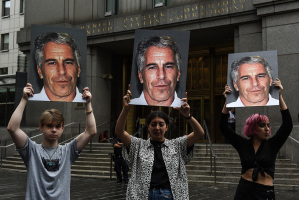You will fall. And fall often. But that's not the end

Have you ever fallen unexpectedly? Maybe you weren’t paying attention to where you were walking. Maybe you were looking at your iPhone. And then you tripped over something. Worst of all is when you can’t break your fall and do a total face plant.
Have you seen that commercial on TV for the little device for seniors — the one where you can push a button and get help? Remember the phrase that goes with that? “I have fallen and I can’t get up.” That can happen to us spiritually as well. You fall hard and then imagine you can’t get up — perhaps ever again.
But the truth is, you can.
In Christ, you can get up and you must get up again. And the strong hand and strong love of the Lord will help you do it. He will forgive you, restore you and call you back into His service.
In the Gospels, we read about Simon Peter’s great fall. He went down hard, standing by a little fire in a courtyard and denying (three times) that he even knew Jesus. Afterwards, he probably wondered if he could ever get back up again or walk with Jesus as he had before.
Peter’s name, of course, wasn’t always Peter. His given name was Simon. When Jesus chose him to be one of His followers, He gave him a new name. Peter means “rock.” I wonder if some of the other disciples snickered a little when that happened. Maybe they were thinking, “Is Jesus serious? Does He really know this guy?”
When you think of a rock you think of something solid, dependable and strong. But the fisherman named Simon was a hot-headed man, impulsive and impetuous. He wasn’t much like a rock at all. When Jesus looks at someone, however, He doesn’t just see them for what they are. He sees them for what they can become.
Before Peter would fully live up to his new name, however, he would have a serious lapse, acting in a way he never imagined himself acting in a hundred years. Maybe as you are reading this you are reliving some hard fall or failure in your past life. Sadly, the past can’t be changed. I can’t control my past any more than I can unscramble an egg. But I can have something to say about my response to my past. Have I learned anything from my mistakes?
Jesus took Peter’s “ending” — his worst moment — and turned it into a new beginning.
Our story begins in the upper room, at the Last Supper. Jesus had just identified His betrayer, Judas Iscariot, and dismissed him. So as Judas went off into the night, Peter, observing all of this, felt this would be a good time to boast of his love for Jesus.
We pick the story up in Matthew 26, as they walked to the Mount of Olives.
Then Jesus told them, “This very night you will all fall away on account of me, for it is written: ‘I will strike the shepherd, and the sheep of the flock will be scattered.’ But after I have risen, I will go ahead of you into Galilee.”
Peter replied, “Even if all fall away on account of you, I never will.”
“I tell you the truth,” Jesus answered, “this very night, before the rooster crows, you will disown me three times.”
But Peter declared, “Even if I have to die with you, I will never disown you” (vv. 31-35).
Step one: self-confidence instead of God confidence
Here was the problem with Peter. He was boasting of his love for God instead of God’s love for him. Some people talk about how much they love the Lord. “Oh, I love the Lord so much. I am so committed to Jesus. I am so devoted to Him.”
That’s okay. But if I’m going to boast, I would rather boast of the love of Jesus for me. To be honest, my own love runs hot and cold. I can be fickle. But His love is consistent. His love is never changing.
Jesus had told His men, “You are all going to fail. You will all desert Me tonight.” But Peter insisted, “No way, Lord. How could You say that? It will never happen to me.” By saying that to Jesus, Peter revealed an unfounded confidence in himself — besides directly contradicting what Jesus had said.
When Jesus says something, it is true. When Jesus says something will happen, it will happen. You can take it to the bank. But Mark’s Gospel tells us that Peter repeatedly insisted on this. You are wrong on this Jesus. I would never do that!
Yet he did.
We must never lower our guard in any area of our lives. We must beware of trusting in our commitment to God instead of His commitment to us. Be careful if you hear yourself say, “I will never fall. I would never do that.” Don’t ever say stuff like that.
Boasting about yourself — even to yourself — sets you up for a fall. You are weaker than you think you are. You are more vulnerable than you realize, and so am I. The Bible says, “Pride goes before destruction, and haughtiness before a fall” (Proverbs 16:18, nlt).
We have all seen it a thousand times, haven’t we?
Step two: prayerlessness
In Matthew 26 we read about our Lord’s prayer in the Garden of Gethsemane.
He went on a little farther and bowed with his face to the ground, praying, “My Father! If it is possible, let this cup of suffering be taken away from me. Yet I want your will to be done, not mine.” Then he returned to the disciples and found them asleep. He said to Peter, “Couldn’t you watch with me even one hour? Keep watch and pray, so that you will not give in to temptation. For the spirit is willing, but the body is weak!” (vv. 39-41).
Our Lord was contemplating the horrors of Calvary. Having complete foreknowledge as God, He knew what was about to happen. The beatings. The crucifixion. And worst of all, having the sins of the whole world for all time placed upon His shoulders.
In His humanity, He recoiled from these things. It was almost too terrible to even contemplate. All He asked from Peter, James, and John was a little companionship in that dark hour. He was saying, “Boys can you just stay awake and pray? Actually, I am warning you. Watch and pray. The spirit is willing but the flesh is weak.”
Peter’s failure to pray was a direct result of the first sin of self-confidence. Pride and prayerlessness go hand in hand. We tell ourselves, “I don’t need God. I have a lot of money in my bank account. I am in good health. I have amazing doctors. I have job security. I have this and that.” But one of these days something will happen where you will realize how much you really do need God.
Prayer, you see, isn’t just there for petition — asking for things. It is also there for protection and preparation. Prayer not only gives us what we want, it prepares us for and protects us from what we don’t want, but sometimes have to face.
Jesus was preparing Peter for what was ahead. A storm was coming. The disciples’ lives were about to be turned upside down, and things would never be the same. So, Jesus was warning them to get ready — to watch and pray.
Has the Lord ever put a burden on your heart to pray for something or someone? Then do it. Don’t push that inner nudge aside. I like the words of Martin Luther when he said, “Pray … and let God worry.” Well, God doesn’t worry. But He loves you and He can handle any situation you will face.
Sometime later, In John 21, the risen Lord Jesus looks the heartbroken Peter in the eyes and restores him. He not only restores their broken fellowship, He recommissions him to be a shepherd and guide to the Lord’s people.
Peter had fallen and thought he couldn’t get up again. He was wrong. All he had to do was grip his Lord’s outstretched hand.
Greg Laurie is the pastor and founder of the Harvest churches in California and Hawaii and Harvest Crusades. He is an evangelist, best-selling author and movie producer. “Jesus Revolution,” a feature film about Laurie’s life from Lionsgate and Kingdom Story Company, releases in theaters February 24, 2023.



























